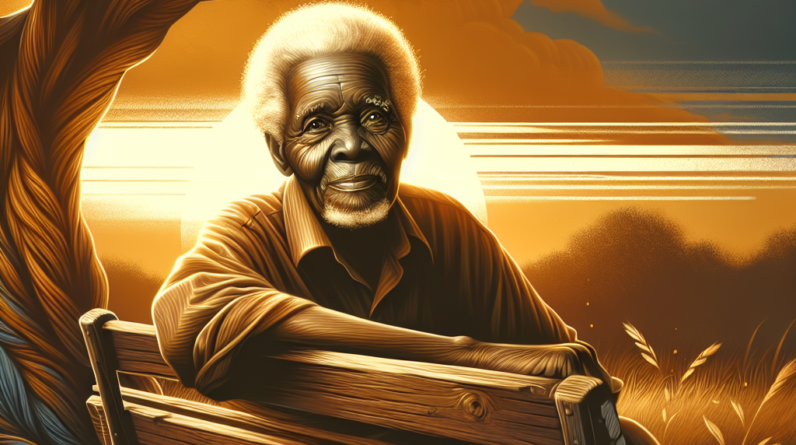
As you navigate through the ever-changing stages of life, you may find yourself pondering the inevitable process of aging. Perhaps you have noticed that with each passing year, you begin to struggle with accepting the reality of growing older. This internal battle can leave you feeling perplexed and questioning the reasons behind your resistance. However, by exploring the relationship between a healthy diet, graceful aging, and embracing the concept of getting older, you may discover a newfound appreciation for the journey that lies ahead.

This image is property of pixabay.com.
The Physical Aging Process
Changes in Appearance
As you age, you may notice a variety of changes in your appearance. Wrinkles and fine lines may start to appear, and your skin may become less elastic and prone to sagging. Your hair may also begin to thin or turn gray. Other physical changes may include a decrease in height due to compression of the spinal discs and changes in weight distribution. While these changes are a natural part of the aging process, they can sometimes cause individuals to feel self-conscious or concerned about their physical appearance.
Decreased Energy Levels
One common aspect of aging is a decrease in energy levels. You may find that you tire more easily and require more rest than before. This can be attributed to a number of factors, including changes in metabolism, hormone levels, and muscle mass. However, it’s important to understand that decreased energy levels are a normal part of getting older and can be managed through a healthy lifestyle, proper nutrition, and regular exercise.
Physical Weakness and Chronic Pain
As you age, you may experience physical weakness and chronic pain. This can be a result of age-related conditions such as arthritis, osteoporosis, or muscle loss. Chronic pain can have a significant impact on your daily life and may limit your ability to perform certain activities. However, there are various treatments and management strategies available to help alleviate pain and improve your physical strength. It’s important to consult with healthcare professionals to develop an appropriate plan of action.
Health Conditions and Diseases
As you get older, you may be more susceptible to developing certain health conditions and diseases. Chronic conditions such as heart disease, diabetes, and hypertension become more common with age. Additionally, your immune system may weaken, which can increase the risk of infections and illnesses. leading a healthy lifestyle, including regular exercise, a balanced diet, and routine medical check-ups, can help prevent or manage these conditions and promote overall well-being.
The Emotional Impact of Aging
Loss of Independence
One of the emotional challenges of aging is the potential loss of independence. As you grow older, you may find that you need assistance with everyday tasks that were previously manageable. This can be difficult to accept and may lead to feelings of frustration, helplessness, or even a sense of being a burden to others. It’s important to recognize that accepting help does not diminish your worth or independence. Seeking support from loved ones and community resources can help maintain a sense of autonomy and improve overall well-being.
Feelings of Isolation and Loneliness
Aging can also bring about feelings of isolation and loneliness. Changes in social roles, such as retirement or the loss of friends and loved ones, can contribute to a sense of disconnection. It’s important to proactively seek social interactions, maintain relationships, and engage in activities that bring joy and fulfillment. Joining social clubs, volunteering, or participating in community events are great ways to stay connected and combat feelings of isolation.
Fear of Death and Mortality
As you age, thoughts of mortality may become more prevalent. It’s natural to experience a fear of death and the uncertainty that comes with it. This fear can evoke feelings of anxiety, sadness, or even depression. Reflecting on your beliefs, finding ways to manage anxiety, and discussing your feelings with loved ones or a professional can help navigate these emotions. Developing a sense of acceptance and finding meaning in the present moment can also contribute to a more peaceful perspective on mortality.
Coping with Loss and Grief
Unfortunately, loss and grief are inevitable aspects of aging. Whether it be the loss of a loved one, a career, or physical abilities, these losses can impact your emotional well-being. It’s important to allow yourself to grieve and process these losses in a way that’s meaningful to you. Seeking support from friends, family, or even joining a support group can provide a safe space to express your emotions and receive comfort during this challenging time.
Social Challenges of Aging
Changing Roles and Identity
As you age, your roles and identity may undergo significant changes. Retirement, children leaving home, or the loss of a spouse can all impact how you perceive yourself. It’s common to experience a sense of purposelessness or confusion about one’s identity as these changes occur. However, embracing these transitions as opportunities for personal growth and reinvention can result in a positive and fulfilling outlook on life. Exploring new hobbies, engaging in lifelong learning, or pursuing new interests can help shape a renewed sense of self and identity.
Financial Concerns and Retirement
Financial concerns often become more prominent as you approach retirement age. The shift from relying on an income to relying on savings or retirement funds can be anxiety-inducing. Effective financial planning, early preparation, and seeking professional advice can help alleviate these concerns. It’s important to create a budget, explore investment options, and maintain a realistic view of your financial situation to ensure a comfortable retirement.
Ageism and Discrimination
Unfortunately, ageism and discrimination are prevalent issues that older individuals may face in society. Stereotypes and biases can lead to unfair treatment, exclusion, or limited opportunities. Recognizing the importance of intergenerational collaboration and challenging ageist attitudes can help create a more inclusive society. Being an advocate for positive aging and educating others about the value and contributions of older adults can contribute to positive social change.
Maintaining Relationships
As you age, it’s important to nurture and maintain relationships with loved ones. The loss of friends or family members can make relationships even more precious and highlight the importance of connection. Communication, active listening, and spending quality time with loved ones can strengthen relationships and create a support system. Building new friendships or joining social groups can also provide opportunities for meaningful connections and combat feelings of loneliness.
Psychological Factors
Self-Esteem and Body Image Issues
Psychological factors such as self-esteem and body image can have a significant impact on overall well-being. As you age, societal expectations and media messaging may perpetuate negative stereotypes about aging, leading to self-doubt and body dissatisfaction. It’s important to challenge these negative beliefs and embrace self-acceptance. Engaging in activities that promote self-care, practicing positive self-talk, and surrounding yourself with supportive individuals can help improve self-esteem and body image issues.
Existential Crisis and Sense of Purpose
Aging can sometimes trigger an existential crisis, where individuals ponder the meaning and purpose of life. This introspection can be both challenging and transformative. Exploring personal values, engaging in activities that bring joy and fulfillment, or seeking opportunities to give back to the community can help cultivate a renewed sense of purpose and navigate the existential questions that arise during the aging process.
Cognitive Decline and Memory Loss
Cognitive decline, including memory loss, is a common concern for many individuals as they age. While changes in memory and cognitive function are a normal part of the aging process, it’s essential to carefully monitor and manage any significant changes. Engaging in mentally stimulating activities, such as puzzles or learning new skills, maintaining a healthy lifestyle, and seeking medical advice can help support cognitive health as you age.
Depression and Anxiety
Depression and anxiety can affect individuals of all ages, including older adults. Life transitions, physical limitations, or isolation may contribute to these mental health challenges. Recognizing the symptoms, seeking professional help, and engaging in evidence-based treatments such as therapy or medication can support emotional well-being. Additionally, maintaining a strong support network, engaging in social activities, and practicing self-care strategies can help manage and prevent these conditions.

This image is property of pixabay.com.
Societal Influences
Media and Cultural Messages
The media and cultural messages can significantly influence our perceptions of aging. Unfortunately, many portrayals of aging in the media are negative, perpetuating stereotypes and unrealistic expectations. Recognizing the potential impact of media and actively seeking alternative representations of aging can help foster a more positive and realistic view of growing older.
Comparison and Societal Expectations
Societal expectations and the pressure to conform to certain standards can be particularly challenging as you age. The constant comparison to others, especially younger individuals, can lead to feelings of inadequacy or a diminished sense of self-worth. It’s crucial to remember that everyone’s journey is unique and that aging is a natural process. Embracing individuality and celebrating personal achievements can help combat the negative effects of comparison and societal expectations.
Lack of Role Models and Representation
The lack of diverse and positive role models in older age groups can also be a societal influence that contributes to negative perceptions of aging. Recognizing the importance of representation and advocating for more inclusive narratives can help challenge ageist attitudes and provide younger generations with a more realistic and positive view of growing older.
Negative Perceptions of Aging
Negative perceptions of aging persist in society, often leading to ageism and discrimination. Challenging these perceptions and advocating for the value, wisdom, and contributions of older individuals is essential for creating a more inclusive society. By promoting positive aging messages, educating others about the realities of aging, and actively addressing ageist attitudes wherever they occur, we can contribute to a more supportive and respectful environment for people of all ages.
The Importance of Self-Care
Prioritizing Physical Health
Taking care of your physical health becomes increasingly important as you age. Engaging in regular exercise, consuming a balanced diet, and maintaining a healthy weight are all essential for overall well-being. Additionally, attending routine medical check-ups, following recommended preventive screenings, and managing chronic conditions are vital components of maintaining optimal physical health as you age.
Maintaining Mental and Emotional Well-being
Prioritizing mental and emotional well-being is crucial for positive aging. Engaging in activities that bring joy, practicing mindfulness or meditation, and seeking social support are all effective strategies for maintaining mental and emotional well-being. Additionally, participating in therapy or counseling can provide valuable tools and support for navigating the emotional challenges that may arise during the aging process.
Staying Active and Engaged
Staying active and engaged in meaningful activities can contribute to a fulfilling and purposeful life as you age. Whether it’s pursuing hobbies, volunteering, or continuing education, finding activities that bring a sense of joy and accomplishment can help combat feelings of boredom or stagnation. Remaining socially connected and maintaining a sense of purpose can also promote overall well-being and enhance the quality of life.
Seeking Support and Professional Help
Recognizing when you need support and seeking professional help is an important aspect of self-care. Whether it’s reaching out to a therapist or counselor to address emotional challenges, joining support groups for individuals facing similar circumstances, or seeking assistance from care services, there are resources available to help navigate the aging journey. Asking for help is a sign of strength and self-awareness, and it can greatly contribute to your overall well-being.

This image is property of pixabay.com.
Acceptance and Resilience
Understanding the Natural Process of Aging
Understanding and accepting the natural process of aging is essential for embracing the later years of life. While it may come with physical and emotional challenges, recognizing that aging is a universal experience can provide a sense of perspective and acceptance. Educating oneself about the physical and psychological changes that occur with aging can help navigate these changes with grace and resilience.
Recognizing and Appreciating Achievements
As you age, it’s important to recognize and appreciate the achievements and milestones you have reached throughout your life. Reflecting on your past accomplishments, setting realistic goals for the future, and celebrating personal growth can help cultivate a sense of pride and contentment. Acknowledging your strengths and resilience can improve self-esteem and contribute to a positive outlook on the aging process.
Finding Meaning and Purpose in Later Years
Finding meaning and purpose in the later years of life is a key aspect of positive aging. While your roles and responsibilities may change, there are still countless opportunities to contribute and make a difference. Identifying your passions, exploring new interests, or volunteering in your community are all ways to find meaning and purpose in this stage of life. Embracing the wisdom and life experience accumulated over the years can also provide a sense of purpose and fulfillment as you continue to grow older.
Adjusting Expectations and Goals
As you age, it’s important to adjust your expectations and goals to align with your current circumstances and capabilities. Recognizing and accepting limitations while finding new ways to engage with life can contribute to a positive and fulfilling aging experience. Redefining success, setting realistic goals, and focusing on personal well-being can help create a meaningful and satisfying life as you navigate the later years.
Strategies for Positive Aging
Cultivating a Positive Mindset
Cultivating a positive mindset is crucial for positive aging. Embracing optimism, gratitude, and self-compassion can help counteract negative thoughts and attitudes associated with aging. Practicing techniques such as positive affirmations, mindfulness, and reframing negative thoughts can foster a positive mindset and promote overall well-being.
Embracing Change and Adaptability
Embracing change and cultivating adaptability are important skills for positive aging. Life is constantly evolving, and being able to navigate transitions and adjust to new circumstances is essential. Accepting change as a natural part of life, maintaining flexibility, and seeking opportunities for personal growth can contribute to a more resilient and fulfilling aging experience.
Staying Connected with Loved Ones
Maintaining strong connections with loved ones is vital for positive aging. Cultivating meaningful relationships and social networks can provide support, companionship, and a sense of belonging. Regularly reaching out to family and friends, participating in social activities, and making new connections can enhance your overall well-being and promote a positive aging experience.
Engaging in Meaningful Activities
Engaging in meaningful activities is essential for positive aging. Find activities that bring you joy, fulfillment, and a sense of purpose. Whether it’s pursuing a hobby, volunteering, or engaging in creative outlets, investing time in activities that align with your values and interests can greatly enhance your overall well-being and contribute to a positive perspective on aging.

Seeking Support and Resources
Therapy and Counseling Services
Therapy and counseling services can provide valuable support for emotional well-being during the aging process. A qualified therapist or counselor can assist in navigating the psychological challenges associated with aging, offering guidance, tools, and strategies to promote emotional health and resilience.
Support Groups and Communities
Joining support groups or communities specifically designed for older adults can provide a safe space to connect, share experiences, and receive support. These groups can offer a sense of belonging, understanding, and validation, helping combat feelings of loneliness or isolation. It’s important to seek out local organizations or online communities that cater to the unique needs and interests of older adults in your area.
Educational Resources for Aging
Educational resources focused on aging can provide valuable information and guidance for navigating the later years of life. Books, articles, podcasts, and websites dedicated to topics such as healthy aging, positive mindset, and life transitions can expand knowledge and provide practical advice for embracing positive aging.
Professional Assistance and Care Services
Seeking professional assistance and care services can be beneficial for individuals facing specific challenges or health conditions. Whether it’s in-home care, assisted living facilities, or specialized medical attention, there are a variety of services available to ensure the well-being and comfort of older adults. Consulting with healthcare professionals and exploring the available options can help determine the most suitable care plan for individual needs.
Conclusion
Navigating the journey of aging is a complex and multidimensional experience. Recognizing and appreciating the physical, emotional, and social challenges that may arise allows for a more holistic understanding of the aging process. By prioritizing self-care, seeking support, and embracing a positive mindset, it is possible to navigate the later years with grace, resilience, and fulfillment. Aging can be a time of wisdom, beauty, and personal growth, offering opportunities to create a meaningful and purposeful life. Embracing the wisdom gained throughout the years, celebrating personal achievements, and staying connected with loved ones are all essential aspects of positive aging. By acknowledging and addressing the challenges while embracing the possibilities, you can create a fulfilling and purposeful journey of growing older.








